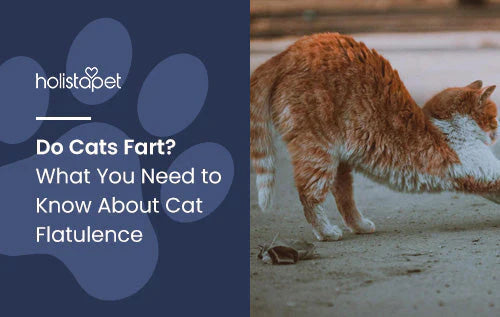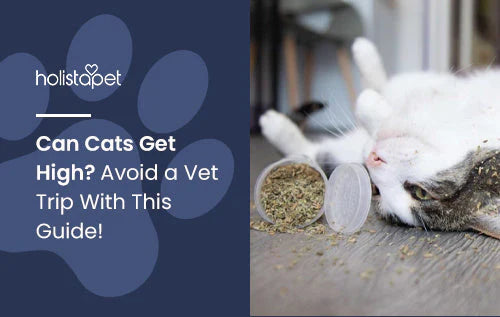While farting here and there, it is normal for our feline friends, it's still something you need to keep an eye — or nostril — on. Sometimes excessive gas can be a sign of underlying issues. Now, what is the best cat gas remedy? Once you figure out why your cat is extra gassy you can also provide some pretty successful treatments at home.
Can Cats Fart?
The short answer? Yes. The longer answer? Not usually too often. All mammals fart but cats fart a little less. Cat farting is nothing to be ashamed of — unless it's going on a little too long. This can mean there's an issue in your cat's digestive system. That's when it's time to address cat farts a bit more seriously.
Normal vs Excessive Cat Gas
The amount a cat farts varies from feline to feline. But if you notice your kitty farting more than usual — or if it smells stronger — there may be something off in your cat's diet or body. You should consult an expert if you notice these symptoms accompanying their gas:
- Diarrhea or vomiting
- Urgent litter box usage
- Abnormal feces (black in color, odd texture, or blood)
- Lack of litter box use and constipation
- Noisy sounds, like grumbling, in their gut
- Decreased appetite and weight loss
- Lethargic behavior
- Drooling
Related Article: 4 Helpful Remedies: How to Naturally Stop Cat Diarrhea
Why Does My Cat Fart So Much?
The main reason for cat gas is a buildup in their digestive system. This is the same reason humans and other species also experience increased flatulence from time to time. Some breeds Sphynx, Devon Rex, and the Ragdoll may be more likely to pass gas since they are more prone to digestive problems and have a more sensitive stomach. Here are a few reasons any cat can develop gas:

Diet
The biggest culprit for a gassy cat is their food. Cats can have very sensitive stomachs and many are allergic to the carbohydrates found in cheaper cat food brands. Food allergies are quite common with kitties. Too much fiber can also lead to gas. Human food is another major culprit for gassy cats so avoid feeding them from your plate.
Related Article: Cat Food Ingredients [Distinguishing Quality]
Dairy
Cats are obligate carnivores, and most cats are lactose intolerant, meaning their digestive systems lack the enzyme lactase, which is necessary to break down lactose found in dairy products. When cats consume dairy, such as milk, cheese, yogurt, or even chocolate, it can lead to significant digestive upset.
Parasites
Intestinal parasites, such as tapeworms, roundworms, and hookworms, are common causes of gastrointestinal problems in cats. These parasites can disrupt the cat's digestive system, leading to certain symptoms such as bloating, excessive gas, and even more severe issues if left untreated.
Intestinal diseases
Certain diseases in cats can result in serious flatulence. An imbalance of gut bacteria, known as microbial imbalance, is a common cause of excessive gas in cats. Conditions such as inflammatory bowel disease (IBD), pancreatic disorders, and even cancer can also trigger excessive gas production.
Allergies
Cats can develop flatulence not only from food-related allergies but also from environmental allergens such as dust, pollen, fleas, ticks, and mites. These allergens can cause an allergic reaction in cats, leading to digestive issues and gas production. While food "fillers" are a common trigger, environmental factors can also play a significant role in a cat's digestive health.
Related Article: Home Remedies for Fleas on Cats [Helpful Tips Inside!]
Prevention of Gas in Cats
To prevent cat farting, going forward you'll need to identify the cause of their gas. Once you figure out which of the previous problems your cat is experiencing, you can make some changes to prevent gas.
Slowing Food Consumption
If your cat was eating too fast or too much, it's important to change their feeding routine. You may want to break up their meals and serve them throughout the day. This will spread out their food intake.
Diet Changes
After these changes, you should slowly begin to change their cat food if they are still farting. It may be a food allergy! Switch out their food gradually with a brand that's lower in carbs and higher in protein.
Activity Levels
Regular exercise can help reduce cat farts. You can encourage your cat to play by getting involved. Throw some toys, tease them with a laser, and shake a ribbon for them to bat and jump at. One other alternative for entertaining cats is to give them some catnip or CBD catnip spray.
Visit a Veterinarian
Schedule a visit with a veterinarian. Discuss medication that prevents parasites and deworming if they haven't been. Your vet may have a bit more advice on preventing and treating parasites. While you're there, it's possible for them to screen for other potential diseases and problems.

The Best Cat Gas Remedies
When dealing with cat flatulence, it's essential to identify the underlying cause to choose the most effective remedy:
Cat Gas Remedy #1 - Yogurt
If your cat is already experiencing gas, there are a few remedies you can try while waiting for a vet visit. One may be a bit surprising: yogurt. While cats shouldn't have dairy, sometimes plain yogurt can reduce intestinal gas. That's because of the food's friendly bacteria. Additionally, CBD cat treats may help support digestive comfort and overall well-being.
Cat Gas Remedy #2 - Fennel
Incorporating fennel into your cat's diet can be an effective remedy for reducing flatulence. To do this, mix a small amount of powdered fennel with water to create a paste that easily adheres to your cat's kibble.
Cat Gas Remedy #3 - Activated Charcoal
Activated charcoal is another effective home remedy that can help reduce the odor associated with cat farts. By adding about 1/8 teaspoon of activated charcoal to your cat's food daily for a few days, you can help absorb and neutralize the unpleasant smell of cat flatulence. However, it's important to note that this is not a long-term solution and should only be used intermittently.
Cat Gas Remedy #4 - Oat Grass
Oat grass can be a soothing remedy for a cat with an uneasy stomach. Many cats are naturally inclined to chew on grass, particularly when they experience digestive discomfort. Providing oat grass for your feline friend may help ease their stomach upset and reduce gas.

Final Thoughts - Do Cats Fart?
Farts smell, and sometimes, gas can be the sign of something even worse. If you notice your cats farting more than usual, you may need to take them to the vet. Meanwhile, there are things you can do to ease your cat's stomach pains and digestive issues. Check out more on cat health!







![Probiotics For Dogs [Soft Chews] - HolistaPet](http://www.holistapet.com/cdn/shop/files/Probiotic-Infographic-1_472d7a29-e30c-435a-9638-1365d8c3a9f9.jpg?v=1725384841&width=104)



























Leave a comment
All comments are moderated before being published.
This site is protected by hCaptcha and the hCaptcha Privacy Policy and Terms of Service apply.